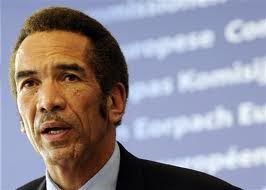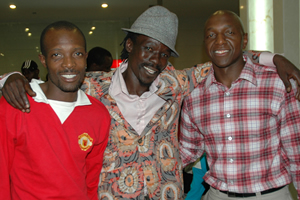ICC needs reform

the reform of the International Criminal Court.
In its resolutions on Regional and Geo-Political Developments at the 12th National People’s Conference in Bulawayo last week, Zanu-PF condemned the arbitrary arrest of leaders from developing nations.
This comes as ICC member-states announced the election of Gambia’s Fatou Bensouda as chief prosecutor.
Bensouda (50) will succeed Luis Moreno-Ocampo of Argentina, whose term of office expires next June.
She is currently his deputy.
However, noting the attack and subsequent killing of Libyan leader Colonel Muammar Gaddafi and the unrest in North Africa and the Middle East, Zanu-PF condemned NATO and its imperialist attacks on the developing world.
President Mugabe, in his opening remarks, also strongly condemned the Libyan attacks.
“We need to be careful. We are in danger because the West plans to attack all countries that have the resources not found in their countries. We are under siege.”
President Mugabe however, assured the nation that the Government was ready to defend Zimbabwe from foreign aggression.
Conference raised alarm at the resurgence of imperialism and neo-colonialism by NATO, its wanton disregard of international law and norms, willful violation and abuse of the UN Security Council resolution and its brutal force under the guise of protecting civilians.
Zanu-PF delegates expressed outrage that NATO used armed aggression to recolonise developing countries by installing puppet regimes to facilitate plunder of natural resources.
The conference resolved “to condemn the abuse of Chapter VII of the United Nations Charter by NATO countries to effect regime change in developing countries in pursuit of their imperialist agenda to exploit and plunder the natural resources of those countries”.
Meanwhile, Bensouda was elected without a vote at a meeting in the UN of the 120-nation Assembly of States Parties to the ICC, which is based at The Hague in the Netherlands.
She will serve a nine-year term starting June 16, 2012.
Diplomats said the other African candidate, Mohamed Chande Othman of Tanzania, withdrew from the race, leaving Bensouda, who had long been the favourite, as the only contender.
Bensouda was named deputy prosecutor of the ICC in 2004 and previously worked as a legal advisor and trial attorney at the International Criminal Tribunal for Rwanda in Arusha, Tanzania.
As chief prosecutor, she will step into the full glare of publicity and controversy that has surrounded the world’s top war crimes court since it came into being in 2002.
While the number of signatories to the Rome Statute that created the ICC is steadily growing, key countries remain outside it.
They include the United States – which fears it could be used against the US military – as well as Russia, China and most Arab states.
Zimbabwe is not a signatory of the Rome Statute.
The ICC is mandated to try cases of war crimes and crimes against humanity that national justice systems cannot or will not prosecute.
Under the leadership of Moreno-Ocampo, the ICC launched seven formal investigations, issued an arrest warrant for Sudan’s president Omar al-Bashir and begun three trials.
The ICC also indicted Col Gaddafi before his death in October, as well as his son Saif al-Islam and intelligence chief Abdullah al-Senussi.
Moreno-Ocampo has however, said he will not demand that the captured Saif al-Islam be handed over to The Hague.
In the latest development involving the ICC, former Ivory Coast president Laurent Gbagbo was flown last month to The Hague to face charges of crimes against humanity.
The court is also pursuing cases in Kenya, Uganda and the Democratic Republic of the Congo.
Some African politicians, including African Union Commission chairman Jean Ping, have charged that the ICC focuses excessively on Africa.
The AU has told its members to ignore the arrest warrant against Sudan’s Bashir, who has visited ICC signatories Chad and Kenya without being detained.
But Bensouda said after her election she disagreed with that view.
“I think ICC is working for Africa and with African victims,” she told reporters.
“I don’t think any of us can deny that the crimes, the atrocities that are happening in Africa are crimes that fall within the jurisdiction of the ICC.”
Botswana President Seretse Khama Ian Khama however, blasted what he called the “increasing failure by (some African states) to honour their obligations under the Rome Statute”.
“The reality is that atrocious human rights abuses and other serious crimes that merit ICC’s attention have and continue to be committed in Africa,” President Khama said.
“And in the majority of situations, it is Africans themselves who invite the intervention of the court.” – Herald Reporters/Reuters.







Comments